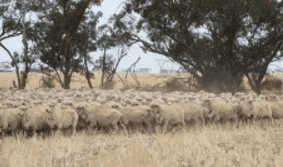 FAILED crops could be a stockfeed risk this year if producers don’t adhere to chemical withholding periods, Victorian farmers have been advised.
FAILED crops could be a stockfeed risk this year if producers don’t adhere to chemical withholding periods, Victorian farmers have been advised.
Statewide chemicals specialist Steven Field from the Department of Economic Development, Jobs, Transports and Resources said due to dry seasonal conditions, there has been an increase in growers cutting or grazing failed crops throughout the Wimmera Mallee and north central regions.
“Grazing or cutting failed crops may not be appropriate if certain types of chemicals have been applied.
“The withholding period of chemicals applied to the crop previously, even pre-emergents should be evaluated to ensure that any stockfeed is fit for purpose and free of unacceptable residues,” he said.
Some chemicals mean feeding the crop to animals is not allowed
Mr Field said withholding periods can apply to harvest, grazing and cutting for stockfeed.
“In some cases there may be a total ban on feeding the crop or its stubble to animals.”
Mr Field said examples of crop withholding periods included:
– Some atrazine products used for weed control in canola have a withholding period for grazing and cutting of stockfeed of 15 weeks for pre-emergent use or six weeks for post-emergent use.
– When triadimefon products are used for rust control on wheat, some formulations (typically 125 g/L) require a 28 day WHP for grazing or cutting for stockfeed whilst others (typically 500 g/kg) never allow use for either grazing or cutting for stockfeed.
– If some 430g/L tebuconazole products were used on cereals, a harvest withholding period of five weeks applies but a withholding period of only 14 days applies for grazing or cutting for stockfeed.
– If some cholorothalonil products are used on pulses, the treated crop can never be grazed.
Use Commodity Vendor Declarations
Mr Field said the Victorian Government also encourages the use of Commodity Vendor Declarations (CVD) when selling any stockfeed.
“These ensure communication between the seller and buyer is clear and ensures that stockfeed is fit for purpose.”
He said CVD forms can be obtained from Meat and Livestock Australia and are essential to ensure that National Vendor Declarations can be adequately completed when selling livestock.
For more information talk to your local agronomist, reseller or consultant, the product manufacturer, the DEDJTR Customer Service Centre on 136 186 or visit www.agriculture.vic.gov.au
Source: DEDJTR.



HAVE YOUR SAY